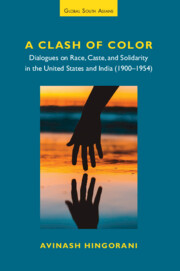 A Clash of Color
A Clash of Color Published online by Cambridge University Press: 28 November 2024
I have chosen to connect the unique histories of both India and the United States (US) for a multitude of reasons. My grandfather, Lakhan H. Massand, was an activist and a freedom fighter during British rule in India. He had an idealistic vision of a free and secular India where there was no oppression, and everyone was equal. To achieve this lofty goal, he was willing to make supreme sacrifices and even withstand the tortures of imprisonment. In fact, when India finally achieved independence in 1947, my grandfather was in jail and was released only in 1948. Unfortunately, my research and visits to India have impressed upon me that my grandfather's vision for an egalitarian Indian society never truly came to fruition. I noticed that many low-caste Indians in Rajasthan, Punjab, Haryana, and New Delhi lived in dilapidated homes in a hyper-segregated region with a history of especially pernicious race and caste prejudice. Likewise, while I studied at Tulane University, I came to understand that a similar form of class and social stratification existed in New Orleans, which consistently disadvantaged local Black Americans. This situation became clearest to me when a fellow academic and friend was racially profiled by the New Orleans Police Department. When he was eighteen, he was picked up at random, physically assaulted by the police, and driven to meet a White woman who had been mugged near Tulane and Loyola University. The police tried to get her to name my friend as the perpetrator. The woman refused and insisted that the man who mugged her was someone else. Yet the police persevered with the false charges until he revealed that one of his relatives was the Deputy Superintendent of Police in New Orleans.
Inspired by my friend's story, and countless others who have experienced discrimination based on their racial background, I have chosen to write a book which further disseminates the realities of the lived experiences of low-caste Indians and Black Americans. Defenders of the American Dream preach that one of the core American values is equality for all, regardless of age, color, disability, gender, national origin, race, religion, creed, sexual orientation, or social status.
To save this book to your Kindle, first ensure no-reply@cambridge.org is added to your Approved Personal Document E-mail List under your Personal Document Settings on the Manage Your Content and Devices page of your Amazon account. Then enter the ‘name’ part of your Kindle email address below. Find out more about saving to your Kindle.
Note you can select to save to either the @free.kindle.com or @kindle.com variations. ‘@free.kindle.com’ emails are free but can only be saved to your device when it is connected to wi-fi. ‘@kindle.com’ emails can be delivered even when you are not connected to wi-fi, but note that service fees apply.
Find out more about the Kindle Personal Document Service.
To save content items to your account, please confirm that you agree to abide by our usage policies. If this is the first time you use this feature, you will be asked to authorise Cambridge Core to connect with your account. Find out more about saving content to Dropbox.
To save content items to your account, please confirm that you agree to abide by our usage policies. If this is the first time you use this feature, you will be asked to authorise Cambridge Core to connect with your account. Find out more about saving content to Google Drive.